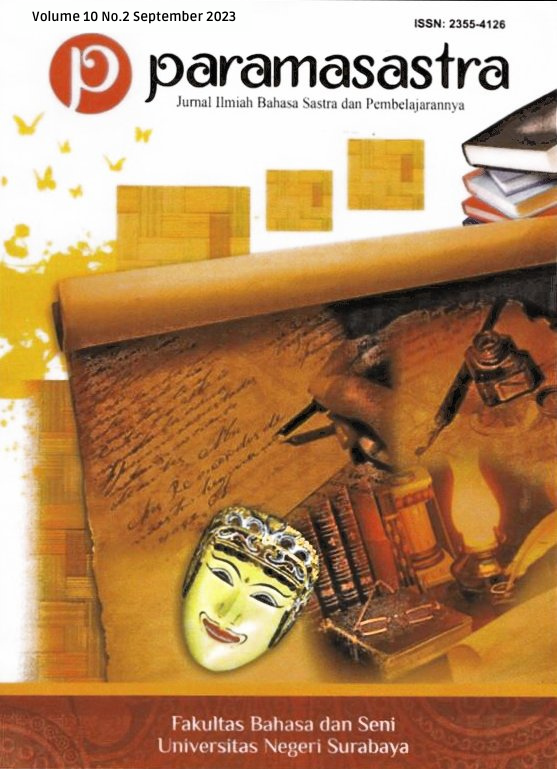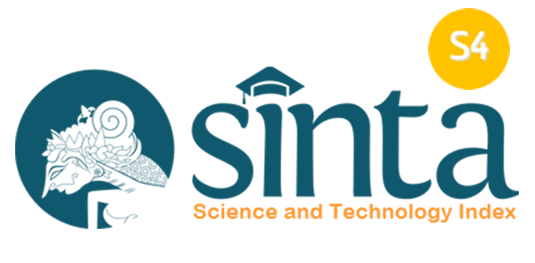PERSEPSI MAHASISWA TERHADAP PENGGUNAAN BALIKAN SESAMA PEMELAJAR DALAM KEMAHIRAN MENULIS DI PERGURUAN TINGGI INDONESIA
DOI:
https://doi.org/10.26740/paramasastra.v10n2.p190-206Abstract
The current difficulty for Indonesians to be open to criticism and suggestions and to show appreciation for the diversity of opinions further encourages the need for the development of an academic culture in Indonesia, especially in higher education. Efforts to develop open-mindedness need to be carried out and this study suggests using peer feedback in writing classes. This study aimed to examine the perceptions of openness of German learners at the B2 language level towards peer-student feedback in students' writing skills. The findings of this mixed study proved that students were open to feedback from fellow students because they considered and used it in writing improvement. Students were also able to provide feedback that was delivered in a facilitative manner to appreciate the voice of the text writer. The results of the questionnaires distributed showed the students' positive attitude towards the feedback of fellow students and the desire to get this feedback in the future.
References
Darmojuwono, Setiawati (2002, Juli). Peran bahasa jerman sebagai piranti pengembangan ilmu di indonesia. Artikel dipresentasikan pada Kongres Linguistik Nasional X dari Masyarakat Linguistik Indonesia di Universitas Udayana, Denpasar, Bali.
Berg, Essy Cathrine. 1999. The effects of trained peer response on ESL students' revision types and writing quality. Journal of Second Language Writing. 8, 3, 215-241
Brinker, Klaus. (2001). Linguistische Textanalyse. 5th Ed. Berlin: E. Schmidt
Gielen, S., Peeters, E., Dochy, F., Onghena. P., Struyven, K. (2010). Improving the effectiveness of peer feedback for learning. Learning and Instruction, 20, 304-315.
Goethe-Institut. Gemeinsame Referenzniveaus: Beschreibung der Gemeinsamen Referenzniveaus. http://www.goethe.de/z/50/commeuro/303.htm pada tanggal 19 Juni 2018
Halimi, Sisilia Setiawati (2004). Mengurangi Beban Mengajar Mengarang: Pengembangan Siswa Belajar Mandiri. Pelba, 17, 55-85.
Hyland, Ken. (2004). Second Language Writing. Cambridge: Cambridge University Press.
Intitute Writing for Writing and Rhetoric Dartmouth. (2014). Responding to Problems: A Facilitative Approach. Dartmouth Collage. http://writing-speech.dartmouth.edu/support-writing-research-and-composing-technology/staff/responding-problems-facilitative <23 Februari 2017)
Kast, Bernd (1999). Fertigkeiten Schreiben: Fernstudieneinheit 12. Berlin: Langenscheidt.
Kleppin, Karin. (1998). Fehler und Fehlerkorrektur: Fernstudieneinheit 19. Berlin: Langenscheidt.
Mei, Ting. & Yuan Quan. 2010. A Case Study of Peer Feedback in a Chinese EFL Writing Classroom. Chinese Journal of Applied Linguistics. 33, 4. 87-98.
Straub, Richard (1996). The Concept of Control in Teacher Response: Defining the Varieties of "Directive" and "Facilitative"Commentary. Collage Composition and Communication (CCC) 47(2). 223-251. 27 Januari 2017. Diunduh dari http://writing2.richmond.edu/training/383/383restricted/straub.pdf, pada.
Triani, Cessy. (2016, Novermber). Peer Review = Critical Thinking and Academic Writing Skills?. Artikel dipresentasikan pada The Seventh Annual International Symposium of Foreign Language Learning (7th AISOFOLL Jakarta: UNJ.
Widiati, Utami. (2003). Trained Peer Response to Develop EFL Students` Positive Attitudes toward Peer Response TEFLIN Journal, XIV, 1,123-139.
Kistanto, Nurdien Harry (2000). Budaya Akademik: Kehidupan dan Kegiatan Akademik di Perguruan Tinggi Negeri di Indonesia. Jakarta: Dewan Riset Nasional, Kantor Menteri Negara Riset dan Teknologi. 4 Juli 2018. http://eprints.undip.ac.id/3608/1/BUDAYA_AKADEMIK_DI_INDONESIA.pdf
Shen, Xi. & Tian, Xianghong. (2012). Academic Culture and Campus Culture of Universities. Canadian Center of Science and Education, 2(2), 61-65.
Taheri, Mohammad. Ansari, Mohammad Reza Jabber & Ganji, Raziyeh. (2013). The Relationship between Cultural Barriers, Open Mindedness and Organizational Innovation. Journal of Basic and Applied Scientific Research. 3 (3), 364-367.
Downloads
Published
How to Cite
Issue
Section
 Abstract views: 375
,
Abstract views: 375
, PDF Downloads: 301
PDF Downloads: 301












